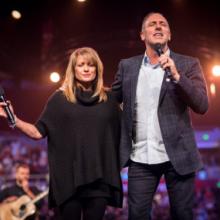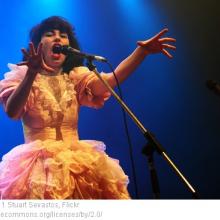new zealand
This is a delicate moment for our small Pacific nation. We are in desperate need of voices of compassion and the nonviolent way of Jesus. And yet Christian conferences in Aotearoa New Zealand which draw thousands often feature communicators who were at The White House praying for Trump in October.
Nazia Kazi knows her history well: A Ph.D. in anthropology, she teaches courses on race, ethnicity, immigration, and Islam in the U.S. at Stockton University in Philadelphia. Kazi’s new book, Islamophobia, Race, and Global Politics, released Dec. 12 from Rowman & Littlefield, discusses the scope of Islamophobia in the U.S. from the country’s historical and political roots. Drawing on examples such as the legacy of Barack Obama, the mainstream media’s portrayal of Muslims, and the justifications given for some of America’s most recent military endeavors, Kazi highlights the vast impact of Islamophobia, connecting this to a long history of U.S. racism.
According to Francirosy Campos, anthropologist and professor at the University of São Paulo (USP), the main problem faced by Muslims in Brazil is prejudice and threats, many of them made on social networks, particularly on Facebook.
As executive director of the Shoulder to Shoulder Campaign, my professional life is concentrated on counteracting anti-Muslim discrimination and violence. When I started this work, there were many from my white Christian community of origin that wondered if I had converted to Islam — as if that’s why I started doing this work. I understood where the people asking this question were coming from, but the assumption behind it bothered me. They assumed the only reason Christians would care about anti-Muslim hate in the United States is if they had converted to Islam themselves. The assumption caused me to dig deeper into why I would care enough about this issue to devote myself to it not in spite of my Christian identity but because of it.
Let me tell you what it’s like to walk into a classroom studying world religions after a mass shooting at a house of worship. I know because I’ve done it twice in six months. Last October, my students and I returned to class after 11 people were gunned down in Pittsburgh during Shabbat services. Last Friday, we awoke to a shooting that killed 50 people during Jumu'ah prayers at a New Zealand masjid.

Image via Alexandros Michailidis/Shutterstock
Muslims believe Friday was chosen by God as a dedicated day of worship. In addition to the prayer itself, which is shorter than the usual midday prayers, Friday services include a sermon, usually given by a professional male Muslim clergy member in Muslim majority countries, but in the West, they are also given by a male lay community member.
We awoke with a deep sense of sadness, mourning, and grief at the news of the horrific shooting in Christchurch, New Zealand. We stand in solidarity with our Muslim brothers and sisters as they mourn the loss of so many beloved family and community members. We pray for all of the victims, their families, and their communities.
At least one gunman killed 49 people and wounded more than 40 during Friday prayers at two New Zealand mosques in the country's worst ever mass shooting, which Prime Minister Jacinda Ardern condemned as terrorism.
THERE’S A bluish light on the beach in The Piano, Jane Campion’s 1993 film about a woman mute by trauma-induced choice, sold from Scotland into an unwanted marriage in New Zealand, who deepens the roots of her soul and expands her reach into the air and the people around her. The same light is in the misty forest where her confused patron and eventual lover lives; but in her husband’s home, it is dark.
I remembered The Piano as an unusual Victorian romance, but watching it recently, in a restored version that accentuates the exquisite strangeness of its images and ideas, opened a forgotten room in my mind. The Piano functions as a love story that could happen “here”—a character liberates herself from oppression, claims her space in the world, and learns to love herself. But it also deals with mythic reality. Love, hate, power, healing, purpose, Being itself. Things I had not noticed the first time.
It’s often this way when we watch films from the past—we remember who we were, which of course is only ever who we thought ourselves to be; we compare with who we think ourselves to be now. A dialogue ensues between the younger and older selves. A movie that we then experienced as a masterpiece now seems clichéd, or one we did not “get” the first time around now manifests as the film we’ve been waiting for all our lives. We weren’t ready before. Sometimes what we need most is to be reminded that the wonder we used to experience might be even more true than the skepticism that now burdens us.
Praise God, from whom all blessings flow;
Praise [God], all creatures here below;
Praise [God] above, ye heavenly host;
Praise Father, Son, and Holy Ghost, Amen.
Words by Thomas Ken (1674)
The Doxology was my favorite hymn growing up. We would sing it every Sunday in church at the end of the service, mostly a cappella. I was amazed at the different harmonies and range in which the hymn could be sung. I loved how simple the words were. But I did not understand the words fully until well into my adult life. As a kid, I immediately disregarded things like animals, plants, insects, and fish as creatures that could praise God. Surely the act of praising God is only reserved for the sentient beings, with a conscience and the ability to say in words “praise God.” No way would God receive the praises of a mosquito, or fern or cat or pig.
It took the glory of creation itself for me to fully understand the words of the Doxology. A year out of college, I was sitting on a kayak in the middle of Doubtful Sound, New Zealand surrounded by snowcapped peaks that dropped right into the water. The sun was shining, dolphins were swimming nearby, and the birds were chirping. Then the song hit me “Praise God, all creatures here below.” I could hear the songs of praise from his non-human creatures. It finally dawned on me that my songs of praise paled in comparison to the winds that touch the peaks of mountains, the perfect songs of birds and the language of dolphins. They are all songs of praise!
The ubiquitous praise song “Shout to the Lord” can be found in many churches across the U.S. on any given Sunday. What fewer people realize is that it comes from a church in the outskirts of Sydney, with a Hillsong brand that is spreading across the globe.
Hillsong Church has combined Christian rock, charismatic energy, and Australian accents to create a winning combination in major cities across the globe. On Sunday at their main campus just outside of Sydney, children and adults swarmed a petting zoo for children and coffee stations outside the glass entrance as volunteers gave out balloons celebrating the 30th anniversary of one of the most globally influential churches.
If I were given one word to describe New Zealand singer-songwriter Kimbra, probably best known for singing the female part on Gotye’s “Somebody That I Used to Know,” it would be eccentric.
But that word is based almost entirely on her live show, where — after dimming the lights and playing the theme for The Godfather over the 9:30 Club’s speakers on Tuesday — Kimbra walked onto the stage, decked out in sleek elevator shoes, a fluffy dress laden with glitter and color (which eventually became a tutu), and what looked like pom poms draped over her shoulders. She would’ve looked even more out of place if her drummer wasn’t rocking a sweet high top fade.
But, even though concerts are performances — and as such necessitate an element of spectacle — the music obviously remains the reason people flock to see their favorite musicians.










